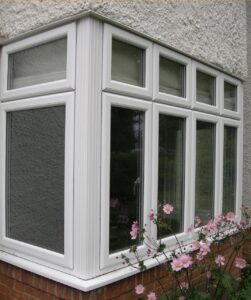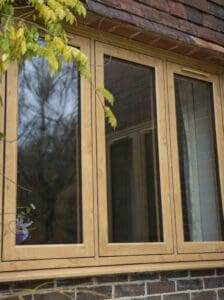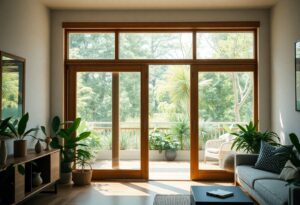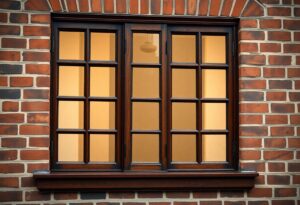There’s a growing need for superior sound quality in your home, especially if you enjoy films or music. Acoustic windows are designed to significantly reduce outside noise, allowing you to immerse yourself fully in your entertainment experience. Whether you’re setting up a home theatre or a dedicated music room, these specially engineered windows help to create a peaceful environment free from distracting sounds. By investing in acoustic windows, you can enhance your space, ensuring that your audio experience is nothing short of exceptional.
What are Acoustic Windows?
The acoustic windows are specially designed windows that help in controlling sound transmission, making them perfect for home theatres and music rooms. Their primary role is to create a peaceful environment by significantly reducing unwanted external noise while optimising sound quality within your space.
Definition and Function
What defines acoustic windows is their unique construction, typically involving multiple layers of glass and specialised materials that help absorb sound. This innovative design minimises external noise infiltration, creating a serene environment ideal for your audio experiences. (Selecting the right type is imperative for achieving the best sound insulation.)
Types of Acoustic Windows
What you need to know is that various types of acoustic windows are available to suit your soundproofing needs. Options include:
- Single-pane: Basic sound reduction.
- Double-pane: Enhanced insulation with two glass layers.
- Triple-pane: Maximum soundproofing with added glass layers.
| Window Type | Soundproofing Capability |
| Single-pane | Basic sound reduction |
| Double-pane | Improved insulation |
| Triple-pane | Ultimate soundproofing |
| Acoustic laminated | Excellent noise control |
After identifying the type that best fits your requirements, you can make an informed decision on how to enhance your sound experience.
Acoustic windows come in several configurations; each has distinct features tailored to your soundproofing needs. The selection of specific materials enhances their robust sound-absorbing capabilities, allowing for a tailored acoustic environment in your home. Acoustic laminated windows, for instance, harness the benefits of specialised glass combined with interlayers designed for optimal sound control.
- Acoustic laminated: Advanced sound control solution.
- Custom sizes: Tailored to fit specific openings.
- Energy-efficient: Helps maintain indoor climate.
| Features | Benefits |
| Sound reduction | Quiet indoor ambiance |
| Energy efficiency | Lower energy costs |
| Variety of designs | Customisable aesthetics |
| Durability | Long-lasting performance |
After familiarising yourself with the different types, you can select the perfect acoustic window to suit your unique requirements.
Benefits of Acoustic Windows
There’s a multitude of benefits that acoustic windows offer, making them an excellent choice for home theatres and music rooms. These specialised installations significantly enhance your listening experience by blocking out unwanted noise pollution, allowing you to immerse yourself fully in the sound without distraction.
Soundproofing
On numerous occasions, acoustic windows have been proven to effectively reduce external noise pollution. This quality makes them ideally suited for spaces where sound clarity matters, like home theatres or music rooms. (Investing in acoustic windows is a decision that can significantly enhance your auditory experience.)
Aesthetic Appeal
Against the common notion, you don’t need to compromise on style while achieving outstanding sound isolation. Acoustic windows come in various design options that can easily complement the aesthetic of your home, ensuring that functional sound isolation enhances rather than detracts from your décor.
And with a range of styles, colours, and materials available, you can create an atmosphere that resonates with your personal taste while enhancing sound quality. These windows not only serve a functional purpose by blocking noise but also add value to your property through their modern appearance and design versatility.
Installation Considerations
One of the necessary factors to contemplate when installing acoustic windows is ensuring they are properly fitted to maximise sound insulation and overall effectiveness. This requires careful planning and execution. You can learn more about techniques for optimal installation on Recording Studio Windows | Sound Insulation Windows | ASI. Proper installation can significantly improve your home theatre or music room experience.
Professional vs. DIY Installation
On the surface, taking a DIY approach to installing acoustic windows may seem cost-effective, but the technical skills required for optimal results often necessitate hiring a professional. While you might save money upfront with DIY, the potential for improper installation could lead to increased noise leakage and decreased sound quality. (Evaluating your own skills is an important decision in this regard.)
Choosing the Right Location
Installation. You should strategically place acoustic windows in your home theatre or music room to maximise sound quality and minimise unwanted noise. Positioning the windows away from noise sources, such as busy roads, and aligning them with reflective surfaces can significantly enhance your acoustics. (The location of your windows can heavily influence your overall sound experience.)
Considering the right location for your acoustic windows involves analysing your room’s layout and potential sound reflection paths. You can optimise sound absorption and clarity by placing the windows on walls that face outward. This thoughtful planning will ensure that your listening experience is free from distracting external sounds, promoting a more immersive environment. Pay attention to natural sound barriers, like trees or fences, to further enhance sound isolation.
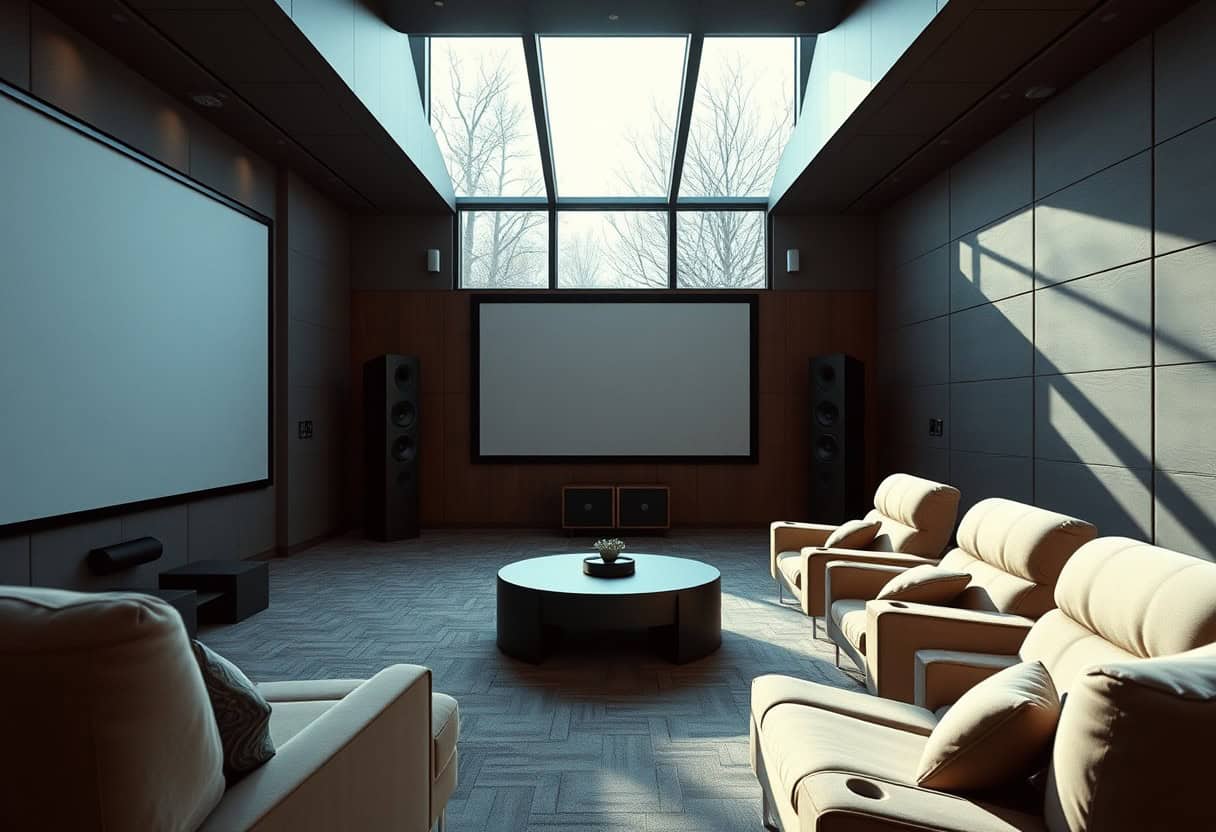
Acoustic Windows vs. Traditional Windows
Not all windows are created equal, especially when it comes to sound insulation. Traditional windows, constructed primarily with single-pane glass, often provide minimal soundproofing, allowing external noise to intrude into your home theatre or music room. In contrast, acoustic windows feature specialised laminated glass and enhanced sealing techniques that can reduce sound transmission by up to 90%. This marked difference makes acoustic windows the superior choice for those seeking to create an immersive auditory experience in their dedicated spaces. (Choosing the right window type can significantly impact your comfort.)
Performance Differences
Across various metrics, acoustic windows outperform traditional windows significantly. For instance, while traditional windows may achieve a Sound Transmission Class (STC) rating of 25 to 30, acoustic windows can reach STC ratings between 35 to 50, translating to a noticeable decline in noise pollution. This reduces intrusive sounds like traffic or construction, allowing you to enjoy your own space without disruption. Additionally, the quality of sound within your home theatre improves as background noise is mitigated, creating a more engaging experience for music and film enthusiasts.
Cost Analysis
Windows can represent a major investment, particularly when weighing acoustic versus traditional choices. Upfront costs for acoustic windows can be around 20% to 30% higher than traditional options, due to enhanced materials and technologies. However, the potential long-term savings cannot be overlooked. Acoustic windows offer improved energy efficiency, which can lower your heating and cooling bills, as well as significantly decrease noise-related stress levels in your living environment.
Hence, when considering the financial aspects, it’s important to look beyond initial installation costs. While acoustic windows may require a higher upfront investment, their energy efficiency can lead to reduced utility bills, potentially recouping costs over time. Moreover, the enhanced comfort and quality of life improvements they provide should be factored into your decision, offering not just sound insulation but also positive impacts on your home’s atmosphere.
Maintenance and Care
To ensure the longevity and performance of your acoustic windows, it is vital to follow a regular maintenance routine. Use a soft, lint-free cloth with warm, soapy water to gently clean the glass surface. Avoid abrasive cleaners or tools that could scratch the glass. You should also check the seals and frames for wear. (Taking care of your windows will prevent costly replacements in the future.)
Cleaning and Upkeep
Among the best practices for maintaining your acoustic windows is to perform regular cleaning fortnightly. Use non-abrasive, pH-balanced cleaning products to avoid damaging the glass or seals. Steer clear of solvents and harsh chemicals that could deteriorate rubber seals or adhesives. Ensuring your windows maintain their clarity will enhance their soundproofing abilities.
Regular Inspections
Inspections should be scheduled at least twice a year to check for any potential damage or wear that might affect your windows’ soundproofing capabilities. Look for signs of cracks, water ingress, or any gaps between the glass and frame. By staying on top of these checks, you can prevent serious issues that could undermine the effectiveness of your acoustic windows, safeguarding your investment and ensuring a serene environment.
Summing up
From above, it is clear that investing in acoustic windows can significantly enhance your home theatre and music room experience. By minimising external noise and optimising sound quality, you can achieve a more immersive environment for enjoying your favourite media. If you are contemplating the impact of large windows on your theatre setup, consider reviewing the effect of having large windows in your theatre room for further insights. Prioritising acoustic features not only elevates your enjoyment but also protects your investment in your home entertainment space.
FAQ
Q: What are acoustic windows and how do they work?
A: Acoustic windows are specially designed windows that reduce the passage of sound through the glass. They work by using thicker glass panes, double or triple glazing, as well as specific framing techniques that minimise sound vibration and transmission. This makes them ideal for home theatres and music rooms, where sound quality is paramount.
Q: Can acoustic windows improve the overall sound quality in my music room?
A: Yes, acoustic windows can significantly enhance the sound quality in a music room. By limiting outside noise and preventing sound from escaping, they create a more controlled acoustic environment, allowing for better sound clarity and an enhanced listening experience.
Q: How do acoustic windows compare to traditional windows regarding cost?
A: Acoustic windows may have a higher upfront cost compared to traditional windows due to their specialised design and materials. However, they can provide long-term savings through reduced soundproofing needs and increased energy efficiency. Therefore, considering their benefits, they can be a worthwhile investment for spaces where sound quality is vital.
Q: Are there any specific installation requirements for acoustic windows?
A: Yes, while acoustic windows can typically be installed in most settings, it is advisable to have them installed by professionals familiar with soundproofing techniques. Proper installation is key to ensuring maximum sound reduction and preventing air leaks which could compromise their effectiveness.
Q: Can I install acoustic windows in a standard home without significant renovations?
A: In many cases, acoustic windows can be installed in standard homes without the need for extensive renovations. However, the existing window frame should be evaluated for compatibility. Consult a professional to determine if structural modifications are necessary for optimal installation.
Q: Do acoustic windows reduce energy efficiency as well?
A: Acoustic windows are often designed with thermal insulation in mind, meaning they can actually enhance energy efficiency as well. The double or triple glazing not only reduces noise but also helps in maintaining indoor temperatures, potentially leading to lower heating and cooling costs.
Q: How effective are acoustic windows for home theatres specifically?
A: Acoustic windows are highly effective for home theatres. They can minimise external noise distractions, allowing for clearer sound reproduction and a more immersive viewing experience. When paired with appropriate sound-dampening materials, these windows can create an optimal audio environment that enhances movie and music enjoyment.


